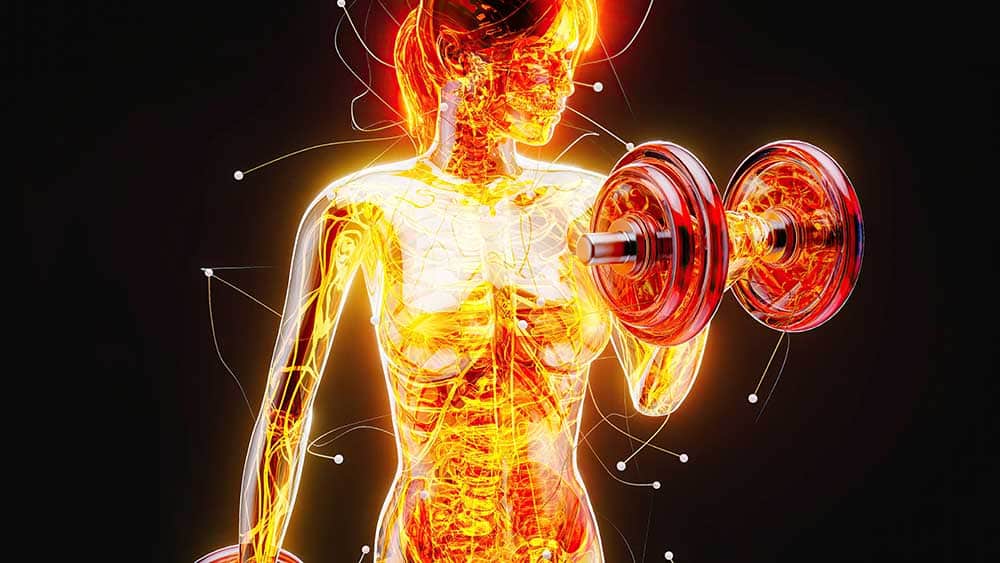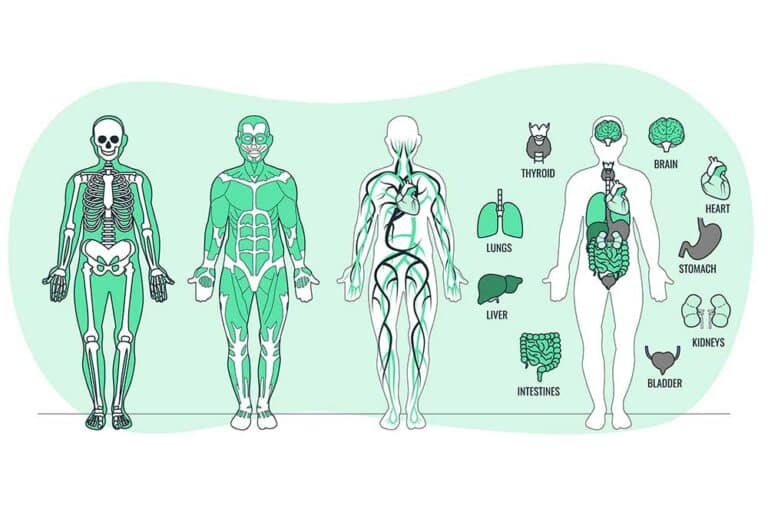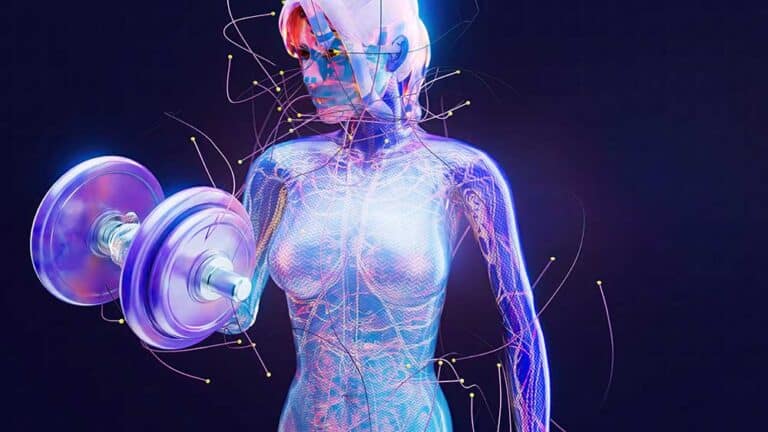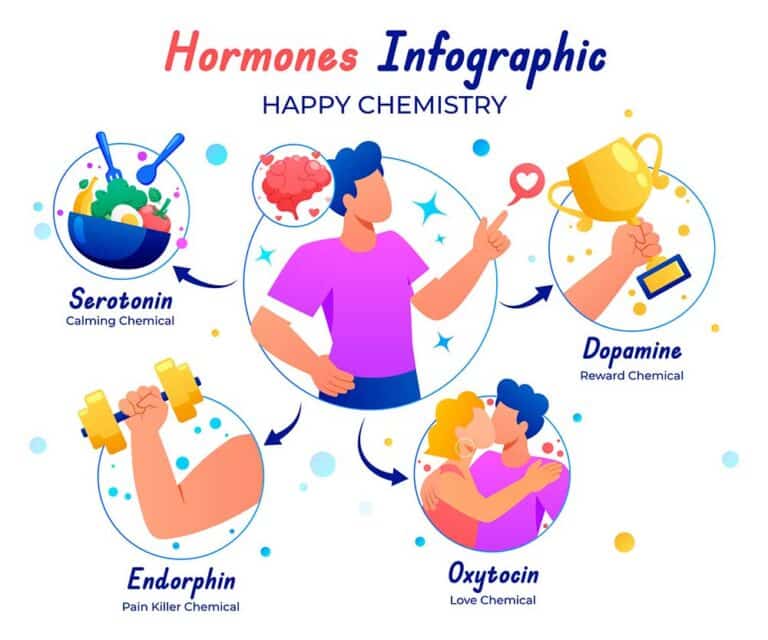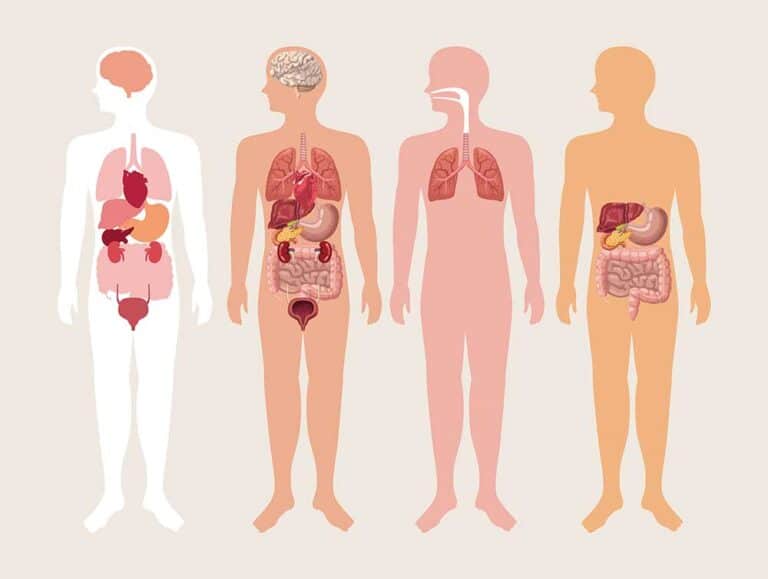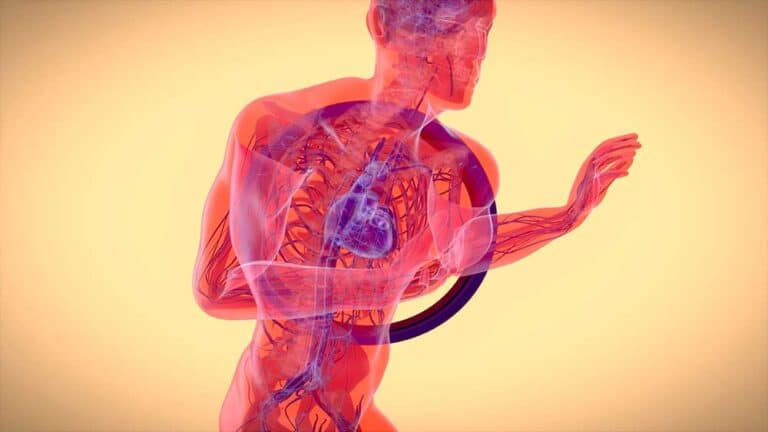Understanding Hormones
Hormones in Human Body
Hormones play a fundamental role in maintaining the body’s internal balance. They act as chemical messengers that travel through the bloodstream to tissues and organs, orchestrating a wide array of bodily functions. There are over 50 hormones identified in the human body so far. These hormones are produced by various endocrine glands and are essential for regulating metabolism, growth, mood, and reproductive processes.
Here is a brief table of some significant hormones and their primary functions:
| Hormone | Source | Main Function |
|---|---|---|
| Insulin | Pancreas | Regulates blood glucose levels |
| Thyroid Hormones (T3 & T4) | Thyroid gland | Metabolic rate regulation |
| Estrogen | Ovaries | Development of female secondary sexual characteristics |
| Testosterone | Testes | Development of male secondary sexual characteristics |
| Cortisol | Adrenal glands | Stress response and metabolism regulation |
To learn more about where hormones come from, visit our article on endocrine glands and their functions.
Role of Hormones
Hormones are pivotal in regulating a variety of bodily functions, with a significant role in metabolism. Metabolism refers to the chemical reactions that occur within the body to maintain life, including the process of converting food into energy. Hormones influence metabolism by controlling the rate at which cells burn fuels from food to produce energy. For instance, an increase in thyroid hormones in the bloodstream accelerates chemical reactions in the body, boosting metabolic processes.
The primary role of these hormones can be detailed as follows:
- Thyroid Hormones: These regulate the body’s basal metabolic rate, affecting how fast or slow metabolic functions occur. Increased levels of thyroid hormones lead to faster energy utilization.
- Insulin: This hormone regulates blood sugar levels by facilitating the uptake of glucose into cells, where it can be used for energy or stored for future use.
- Estrogen and Testosterone: These hormones not only influence reproductive functions but also have an impact on muscle mass and fat distribution, which are crucial for metabolic health.
- Cortisol: Known as the stress hormone, cortisol plays a role in metabolism by modulating blood sugar levels and fat, protein, and carbohydrate metabolism.
Understanding the role of hormones in metabolism is vital for grasping the complexities of endocrinology and metabolism functions. Hormonal imbalances can lead to various health issues, impacting metabolism, weight, and overall well-being. For more information on how these imbalances affect the body, check out our article on endocrine system diseases and disorders.
Key Endocrine Glands
Understanding the various endocrine glands in the human body is essential to comprehending the crucial role hormones play in metabolism. This section will focus on the thyroid gland, parathyroid glands, and adrenal glands, each of which contributes significantly to metabolic processes.
Thyroid Gland Function
The thyroid gland plays a pivotal role in regulating metabolism. Located in the neck, it produces two primary hormones: thyroxine (T4) and triiodothyronine (T3). According to the Cleveland Clinic, these hormones influence nearly every cell in the body by stimulating metabolism and promoting body heat production.
| Hormone | Primary Function |
|---|---|
| Thyroxine (T4) | Regulates metabolism |
| Triiodothyronine (T3) | Increases body’s metabolic rate |
Internally, thyroid hormones set the rate at which the body converts food into energy (metabolism rate). Learn more about the thyroid’s impact on metabolic functions in our endocrinology and metabolism basics.
Parathyroid Glands
Behind the thyroid gland are the parathyroid glands, small yet vital glands that release parathyroid hormone (PTH). According to the Cleveland Clinic, PTH is responsible for maintaining calcium balance in the blood and supporting bone health.
| Hormone | Primary Function |
|---|---|
| Parathyroid Hormone (PTH) | Regulates calcium levels in blood |
Proper calcium levels are crucial not only for bone health but also for muscle function and nerve signaling. For more detailed information, you can read about endocrine glands and their functions.
Adrenal Glands
Situated atop the kidneys, the adrenal glands are responsible for producing several hormones, including adrenaline and cortisol. The Cleveland Clinic notes that these hormones are integral to stress responses and energy regulation.
| Hormone | Primary Function |
|---|---|
| Adrenaline | Increases heart rate and energy levels |
| Cortisol | Regulates metabolism and stress response |
Cortisol, often referred to as the “stress hormone,” helps regulate metabolism by influencing how the body stores fat and uses sugar for energy. Adrenaline, on the other hand, prepares the body for ‘fight or flight’ situations by increasing heart rate and energy availability. For further reading, visit endocrinology and metabolism functions.
These key glands underscore the complexity and importance of the endocrine system in managing metabolic processes. Their hormones not only influence overall energy levels but also play crucial roles in maintaining homeostasis, which you can learn more about in our article on endocrine system and homeostasis.
Significant Hormones
Understanding the role of significant hormones in the human body is crucial for comprehending the complex interactions within endocrinology and metabolism. Below, we explore the functions of three key hormones: insulin, testosterone and androgens, and estrogen and progesterone.
Insulin Function
Insulin, produced by the pancreas, plays a critical role in glucose metabolism and energy regulation. When blood glucose levels rise, insulin is released by the beta cells of the pancreas. This hormone facilitates the uptake of glucose into muscle and liver cells, and promotes the conversion of glucose into glycogen and fat.
| Function | Description |
|---|---|
| Glucose Uptake | Enhances glucose uptake in muscles and liver |
| Glycogenesis | Converts glucose to glycogen in the liver |
| Lipogenesis | Converts glucose to fat in adipocytes |
| Protein Synthesis | Aids protein synthesis in various tissues |
Insulin also regulates macronutrient metabolism, including gluconeogenesis, glycolysis, and lipolysis, by influencing key pathways such as IRS-PI3K-PDK1-Akt (NCBI). For more on how insulin impacts the body’s energy production and cellular homeostasis, see our section on endocrine system functions.
Testosterone & Androgens
Testosterone, a primary androgen hormone, is produced mainly in the testes in males and in smaller amounts in the ovaries and adrenal glands in females. This hormone is essential for the development of male secondary sexual characteristics, such as muscle mass, deep voice, and facial hair. It also plays a significant role in maintaining libido in both sexes, influencing bone density, and supporting muscle growth.
| Function | Description |
|---|---|
| Secondary Sexual Characteristics | Development of male features (muscle mass, facial hair) |
| Libido | Influences sexual drive in both males and females |
| Bone Density | Supports bone health and density |
| Muscle Growth | Essential for muscle development and maintenance |
Testosterone levels can impact overall energy levels and metabolic processes. For additional insights, explore our article on endocrine system anatomy and physiology.
Estrogen & Progesterone
Estrogen and progesterone are critical hormones in the female reproductive system. Produced primarily in the ovaries, these hormones regulate the menstrual cycle, maintain pregnancy, and influence secondary sexual characteristics such as breast development and fat distribution.
| Hormone | Function | Description |
|---|---|---|
| Estrogen | Menstrual Cycle Regulation | Controls various phases of the cycle |
| Secondary Sexual Characteristics | Breast development, fat distribution | |
| Progesterone | Pregnancy Maintenance | Prepares and maintains the uterine lining for pregnancy |
| Water Retention | Increases fluid retention during menstrual cycle and pregnancy |
The balance between estrogen and progesterone is essential for reproductive health and metabolic processes. Any imbalance can lead to issues such as weight gain, mood swings, and changes in energy levels. For details on how hormonal imbalances affect metabolism, visit our section on hormonal imbalances.
Understanding these significant hormones and their functions provides insight into the intricate regulatory mechanisms of the human body. Each hormone plays a unique role in maintaining metabolic balance and overall health. By managing hormone levels and addressing any imbalances, individuals can better maintain their metabolic health. Explore more about the endocrine system and homeostasis to understand the broader implications of these hormones.
Hormonal Imbalances
Hormonal imbalances can have profound impacts on an individual’s metabolism, weight, and mental health. This section explores these effects in detail.
Impact on Metabolism
Hormones play a significant role in regulating metabolism, which includes all the chemical reactions in the body that convert food into energy. When the delicate balance of hormones is disrupted, it can lead to metabolic issues. Key hormones like insulin, cortisol, thyroid hormones, and sex hormones are crucial for maintaining metabolic homeostasis.
Imbalances in thyroid hormones, for example, can lead to conditions such as hypothyroidism or hyperthyroidism, each of which can severely affect metabolism. For more information on the functions of these hormones, visit our page on endocrine glands functions.
Weight Gain & Hormones
Hormonal imbalances can significantly impact body weight, often leading to unexpected weight gain. Hormones like cortisol, insulin, and estrogen are deeply involved in weight regulation. For instance, an excess of cortisol, often termed the “stress hormone,” can increase appetite and lead to fat accumulation, particularly in the abdominal area (Cleveland Clinic).
Certain conditions like hypothyroidism, polycystic ovary syndrome (PCOS), and Cushing’s syndrome are associated with hormonal imbalances that promote weight gain. Consulting a healthcare provider for appropriate evaluation and management is essential if experiencing unexpected weight gain.
| Condition | Hormone Affected | Effect on Weight |
|---|---|---|
| Hypothyroidism | Thyroid Hormones | Weight Gain |
| PCOS | Insulin & Androgens | Weight Gain |
| Cushing’s Syndrome | Cortisol | Weight Gain |
For further reading on the impact of hormones on weight, check out our resources on endocrinology and metabolism functions and endocrinology and metabolism basics.
Hormones & Anxiety
Hormonal imbalances can also contribute to anxiety. Conditions such as thyroid disorders, adrenal gland disorders, and diabetes affect the release of stress hormones like cortisol and adrenaline. These stress hormones can increase feelings of anxiety and stress (Cleveland Clinic).
For example, overactive thyroid (hyperthyroidism) can lead to symptoms like nervousness, irritability, and anxiety. Similarly, insufficient cortisol production in adrenal insufficiency can lead to fatigue and anxiety.
To understand more about how the endocrine system impacts mental health, consider exploring our articles on endocrine system diseases and disorders and endocrine system and homeostasis.
Hormones and Weight
The role of hormones in metabolism can greatly influence body weight, making it essential to understand how different hormones affect weight management.
Factors Contributing to Weight Gain
Several factors can contribute to weight gain, particularly hormonal imbalances. For example, hormones such as cortisol, insulin, estrogen, and thyroid hormones are closely linked to body weight and metabolism.
| Hormone | Role in Weight Gain |
|---|---|
| Cortisol | Elevated levels can lead to increased appetite and fat storage, particularly around the abdomen. |
| Insulin | High insulin levels can cause weight gain by promoting fat storage and preventing fat breakdown. |
| Estrogen | Low levels during perimenopause and menopause can lead to weight gain, particularly around the hips and thighs. |
| Thyroid Hormones | Low thyroid hormone levels (hypothyroidism) slow down metabolism, leading to weight gain. |
Hormones and Unexpected Weight Gain
Unexpected weight gain can often be traced back to hormonal imbalances. Conditions such as hypothyroidism, Polycystic Ovary Syndrome (PCOS), and Cushing’s syndrome are known to disrupt normal metabolic processes, leading to weight gain. If experiencing unexpected weight gain, it is essential to consult a healthcare provider for appropriate evaluation and management.
| Condition | Hormonal Imbalance | Symptoms |
|---|---|---|
| Hypothyroidism | Low thyroid hormone | Fatigue, weight gain, cold intolerance |
| PCOS | Elevated androgens and insulin | Irregular periods, weight gain, acne |
| Cushing’s Syndrome | High cortisol | Weight gain, particularly in the trunk, face, and neck |
Managing Weight with Hormonal Imbalances
Managing weight with hormonal imbalances requires a multi-faceted approach. Lifestyle modifications, including a balanced diet and regular exercise, can help maintain weight. In addition, medical interventions, such as hormone replacement therapy or medications, might be necessary to address the underlying hormonal issues.
For instance, estrogen replacement therapy can help prevent shifts toward male-pattern obesity in women after menopause. Medications to manage insulin levels might be prescribed for those with PCOS or insulin resistance.
For more detailed information on managing hormonal disorders and their treatments, read our article on endocrine disorders and treatments.
By understanding the complex relationship between hormones and weight, individuals can take proactive steps to manage their weight effectively, even with hormonal imbalances. For further reading on the human body endocrine system, visit our comprehensive guide.
Hormones and Metabolic Processes
Understanding the role of hormones in metabolism is essential for grasping how the body converts food into energy. Various hormones play different roles in metabolism, influencing glucose regulation, thermogenesis, and overall metabolic rate.
Hormonal Influence on Metabolism
The thyroid gland is a key player in controlling the speed of metabolism, also known as the metabolic rate. Thyroid hormones regulate the rate at which cells burn fuels from food to make energy (Cleveland Clinic). More thyroid hormone in the bloodstream accelerates chemical reactions, speeding up metabolic processes (KidsHealth).
| Hormone | Function |
|---|---|
| Thyroid Hormones | Regulate metabolic rate |
| Insulin | Controls fat synthesis and glucose uptake |
| Adrenaline | Promotes fat loss and energy expenditure |
| Growth Hormone (GH) | Reduces fat mass and enhances fat oxidation |
Hormonal Regulation of Glucose
Insulin, produced by the pancreas, is pivotal in regulating glucose levels in the blood. It promotes the uptake of glucose by cells, where it is either used for energy or stored as glycogen. Insulin also affects fat synthesis by controlling the activity and production of transcription factors like SREBPs (Source). Hormone replacement therapy (HRT) has been shown to significantly decrease fasting insulin and improve insulin resistance in perimenopausal and postmenopausal women.
| Condition | Effect of Insulin |
|---|---|
| High Blood Glucose | Promotes glucose uptake and storage |
| Low Blood Glucose | Reduces glucose uptake |
Thermogenic Effects of Hormones
Hormones also play a crucial role in thermogenesis, the process by which the body generates heat. Adrenaline, for example, induces the expression of extrapituitary prolactin in adipose tissue macrophages, promoting fat weight loss. Growth hormone (GH) not only reduces de novo lipogenesis in adipose tissue but also affects hepatic β-oxidation, leading to fat mass loss (Source).
Thermogenic hormones increase the basal metabolic rate (BMR), thus enhancing calorie burning even at rest. This is particularly important for managing weight and preventing obesity.
For further information on the endocrine system and homeostasis, visit our detailed articles on the endocrine system anatomy and physiology and endocrine glands and their functions.
The interplay between various hormones and metabolic processes elucidates the complexity of the human body’s energy regulation mechanisms. By understanding these hormones, one can better manage and maintain a healthy metabolism.
- About the Author
- Latest Posts
Johnnie D. Jackow Sr., the founder and CEO of Total Body Fitness, Worldwide, has a long-standing career in the fitness industry. He began as a certified personal trainer in the mid-90s and soon after authored his first weight loss book in 1998. This led to the launch of Total Body Fitness, Nationwide in the USA at the same time. Johnnie gained recognition as the fitness guru of his time, running infomercials on local TV late at night in Houston, Texas. Over the years, he has helped more than 40,000 individuals from all over the world achieve their health and fitness goals. With over 60,000 hours of documented training in integrative functional medicine, he completed his PhD in human physiology in 2010. His primary objective is to assist people in reaching their health and fitness goals through alternative approaches rather than relying solely on conventional medicine and pharmaceutical drugs. Today, with almost three decades of experience under his belt, Johnnie continues to be a leader in health and fitness.

